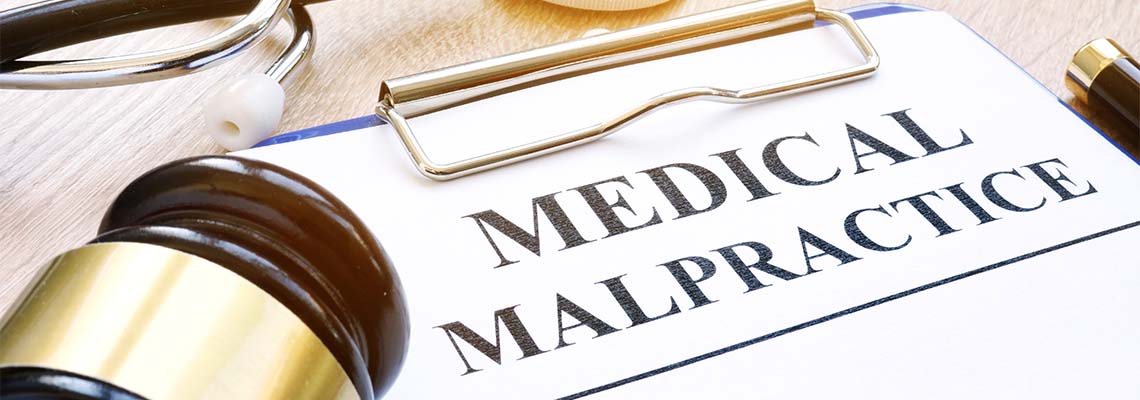
The Do's and Don’ts of Pursuing Medical Malpractice Claims
If you have been injured or incapacitated by a medical provider—or if your loved one has been injured or passed away as a result of medical malpractice or negligence—you may be wondering where to turn. What should your next steps be?
If you are thinking of filing a medical malpractice claim in Pennsylvania, look no further than Goldberg, Goldberg & Maloney in West Chester, where our attorneys are ready to help you seek justice. We have the experience, compassion, and knowledge to assist you during these hard times while keeping your best interests in mind.
What Is Medical Malpractice/Medical Negligence?
Medical malpractice is an extreme form of medical negligence, although both terms are sometimes used interchangeably. When a medical professional owes you a duty of care and unintentionally makes a mistake that then breaches that duty of care, the result is medical negligence. Medical negligence can occur, for example, when a medical professional makes a misdiagnosis causing a patient’s disease to progress past the point of effective treatment, or when a surgeon accidentally nicks an organ during surgery. More examples include, a surgeon intentionally cutting corners (such as willfully failing to administer the proper tests before a surgery, or deliberately failing to sterilize equipment).
For a medical malpractice/negligence claim to be successful, the patient must prove that:
There was a doctor-patient relationship.
The doctor failed to act as a reasonable doctor should have in the same situation and breached the duty of care owed to the patient as their doctor.
Due to that breach of care, the patient suffered an injury.
The patient suffered economic damages (such as lost wages or high medical bills) or noneconomic damages (such as pain and suffering).
To help you begin the process with the most accurate information, we’ve listed some practical “Do’s” and “Don’ts” about filing medical malpractice claims in Pennsylvania.
DO File the Claim as Quickly After the Injury as Possible
In Pennsylvania, you have two years from the date that you discovered the malpractice or negligence to file a claim. Minors can file a medical malpractice claim 2 years after their 18th birthday for malpractice or negligence that occurred before they turned 18.
DO Know Pennsylvania’s Laws About Medical Malpractice Review Requirements
Once you and your attorney have filed a complaint for your Pennsylvania medical malpractice/negligence claim, you have 60 days to file what is called a “certificate of merit.” A licensed medical professional must sign this document under oath, testifying that they have studied the case and have concluded that it is probable that the medical professional involved in the case (the defendant) caused harm to the patient (the plaintiff).
DO Gather/Obtain Medical Records
Your attorney will need to review your medical records in order to support your claim. Request documents containing test results, doctors’ notes, medication records, etc.—anything that you feel will be relevant to your case. Essentially, medical records are the most useful form of evidence in medical malpractice/negligence cases.
DO Hire an Experienced Attorney
A good attorney can mean the difference between the success or failure of your medical malpractice/negligence claim. This is because an attorney will be able to use their knowledge and expertise to gather supporting evidence and present this evidence convincingly, whether while negotiating an out-of-court settlement or while making your case to a judge.
DON’T Contact the Doctor’s Insurance Company Directly
Do not talk to any insurance agents without first speaking to your attorney. Your attorney can answer questions an insurance company might have; your attorney will understand how to speak to insurance agents, who will most likely try to avoid paying out the amount you truly deserve. Often, the insurance company will try to get you to make a statement about your injuries. Whatever you say to them can be used later to discredit your claims; for example, if you forget a few important details about your injury when making an initial statement, the insurance company can later try to use that omission to claim that you are not as hurt as you truly are.
DON’T Argue With or Talk Negatively About Your Doctor
You should avoid accusing or talking to your doctor about the suspected malpractice or negligence before you do so formally with an attorney’s help. As noted above, any comments you make can be used against you later. Avoid posting on social media about the doctor or the case without talking to your attorney first; the doctor could later sue you for defamation.
DON’T Miss Medical Appointments
It is important to keep up with your medical appointments (ideally with a new provider). Your injuries will serve as evidence, and documenting those injuries properly can make all the difference to the outcome of your claim. Remember: your medical records are your best evidence. The insurance company will try to scrutinize your behavior and determine whether or not you are following medical advice; if they determine that you are not, they can claim you are not as injured as you say you are. To the best of your ability, follow medical advice.
Make Informed Decisions Every Step of the Way
If you’ve been injured by your medical provider, don’t wait to pursue the compensation you deserve. Our attorneys Lawrence and Joel Goldberg, Chad Maloney, Basil G. Joy, and Matthew Brooks are passionate about supporting their clients through the often-difficult personal injury claim process. If you’re thinking of filing a medical malpractice claim in Pennsylvania, call us at Goldberg, Goldberg & Maloney in West Chester for a free initial consultation.